

 |
 |
|
 |
|
| About Us |
|
Read Past Issues | Resources | Composer Links |
Chin was born in 1961 in Seoul, Korea. Following lessons in piano and music theory from a very early age, her studies continued at the National University Seoul, including composition with Sukhi Kang. She appeared as pianist at the Pan Music Festivals and in 1984 her composition Gestalten (Figures) was selected for the ISCM World Music Days in Canada and for the UNESCO 'Rostrum for Composers.' In 1985 she moved to Europe when she received the DAAD stipend for study in Germany, and took composition lessons with György Ligeti in Hamburg until 1988. Since then, Unsuk Chin has lived in Berlin, composing and working in the electronic studio of the Technical University Berlin. Chin's compositions have been performed at numerous festivals and concert series in Europe, the Far East and the USA. Her most widely performed work is Akrostichon- Wortspiel for solo soprano and ensemble, programmed in 15 countries to date by such leading ensembles as Ensemble Modern conducted by George Benjamin, Birmingham Contemporary Music Group conducted by Simon Rattle, the Nieuw Ensemble of Amsterdam, Asko Ensemble, Ictus Ensemble, and the new music groups of the Los Angeles Philharmonic and Philharmonia Orchestra. Other works include Fantaisie mécanique and Xi, both commissioned by the Ensemble Intercontemporain, the prize-winning orchestral work santika Ekatala, which was premiered by the Tokyo Metropolitan Symphony Orchestra, ParaMetaString commissioned by the Kronos Quartet, a Piano Concerto written for Rolf Hind, and Miroirs des temps, commissioned by the BBC for The Hilliard Ensemble and the London Philharmonic. Kalà for soloists, chorus and orchestra was co-commissioned by the Danish Radio Symphony, the Gothenburg Symphony and the Oslo Philharmonic orchestras and premiered under the baton of Peter Eötvös in March 2001. "My music is a reflection of my dreams," Chin writes. "I try to render into music the visions of immense light and of an incredible magnificence of colours that I see in all my dreams, a play of light and colours floating through the room and at the same time forming a fluid sound sculpture. Its beauty is very abstract and remote, but it is for these very qualities that it addresses the emotions and can communicate joy and warmth."
Adams was cited by the selection committee for "his fusing of a wide range of styles into a voice entirely new and distinctive, and for his connection to and reflection of the world around us." As winner of the Nemmers Prize, he receives a cash award of $100,000, a performance of one of his works by the Chicago Symphony Orchestra during the 2005-2006 season, and will serve a residency at Northwestern University School of Music. "I am tremendously honored to be selected as the first composer to receive the Nemmers Prize in Musical Composition," said Adams. "It comes as both a surprise and a delight to know that my music is so highly regarded. I look forward to my residency at the Northwestern School of Music. Spending significant time with students is something I have missed very much in recent years." "John
Adams is a giant in the field of composition," said Northwestern School
of Music Dean Toni-Marie Montgomery. "As one of the most performed living
American composers, it is clear that he has captured the imagination of
both musicians and audiences. His presence on our campus will be of great
interest and benefit to students, faculty, and the Chicago community."
|

|
Uri Caine, Relache and All That Jazz
An Interview with Tobias Picker Handmaid Tale's Debuts in English Rautavaara Joins B&G Who's Afraid of Julia Wolfe Derek Bermel's Soul Garden The Pianist: The Extraordinary True Story of Wladyslaw Szpilman John Adams' Atomic Opera A Bridge Not Far Enough Turnage Signs With B&H Sophie's Wrong Choice Copland's Mexico On Being Arvo Rzewski Plays Rzewski Praising Lee Hyla David Lang's Passing Measures
|
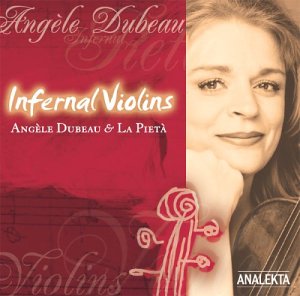
Infernal Violins Performer(s): Angele Dubeau, Le Pieta Analekta Call
it Angèle meets the devil. Call it crossover. But resistance
is futile.
|
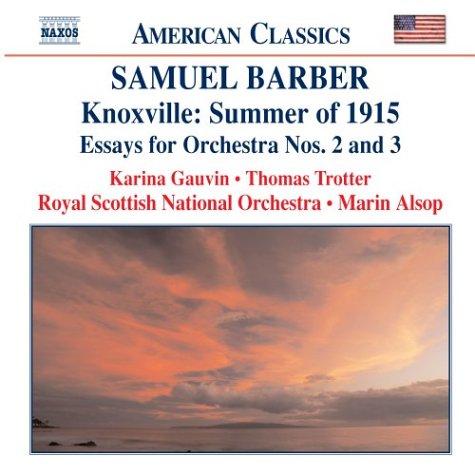
Knoxville: Summer of 1915 / Essays for Orchestra Karina Gauvin, soprano / Thomas Trotter, organ / Royal Scottish National Orchestra / Marin Alsop, conductor Gramophone made this its top pick of the month and it's easy to understand why. The young Canadian soprano Karina Gauvin delivers a drop-dead gorgeous reading of Barber's magical setting of a James Agee poem. Marin Alsop is also excellent in the two Essays for orchestra, works written for Bruno Walter and Eugene Ormandy, respectively. |
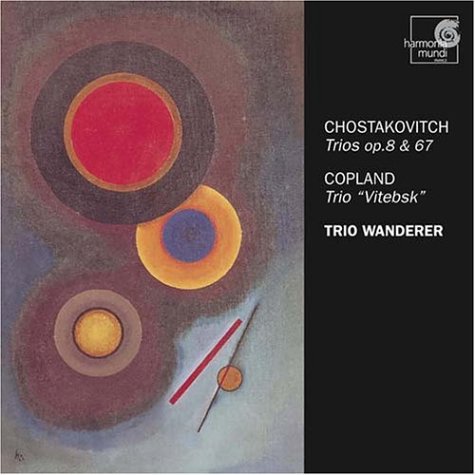
Piano Trios 1 & 2 Vitebsk Trio Composers: Shostakovich, Copland Trio Wanderer harmonia mundi Two well-known masterpieces by Dmitri Shostakovich are paired to fine effect with a less well-known ‘Russian’ work by Aaron Copland. Copland’s infrequently heard Vitebsk Trio of 1929 is an early work, based on a Jewish theme the composer heard at a performance of Dybbuk, a play by Shalom Ansky (who was born in the town of Vitebsk). The work combines elements of the neoclassicism and folk style of Stravinsky with experiments in polytonality and microtones. Brilliantly performed by Trio Wanderer. |
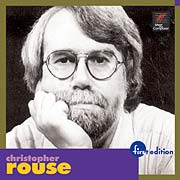
Symphony No.1, Phantasmata The Baltimore Symphony Orchestra, David Zinman First Edition First
released on Nonesuch in 1989, this all-world-premiere title, which
did much to bring Rouse’s immense talent to a wider public, boasts 24-bit
newly remastered sound and the complete and lively interview with the composer
conducted by Glenn Watkins. Conductor David Zinman’s close collaboration
with Rouse ensured that the introspective Symphony No. 1 (with its references
to Bruckner and Shostakovich) and the highly surreal Phantasmata triptych
received maximum voice.
|
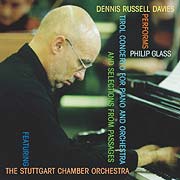
Tirol Concerto, Passages Dennis Russell Davies (piano) Stuttgart Chamber Orchestra Orange Mountain Philip Glass’ Tirol Concerto for Piano and Orchestra was commissioned by the Tyrol, Austria Tourist Board and had its world premiere at the Tyrol Festival “Klangspuren” in Jenbach, in 2000. While staying in Tyrol, Glass studied sound documents and sheet music of Tyrolese folk-music. In his Tirol Concerto, played here by conductor/pianist Dennis Russell Davies and the Stuttgart Chamber Orchestra, This disc also features selections from Passages, Glass's collaboration with Indian Sitar master Ravi Shankar, as arranged by Davies. |
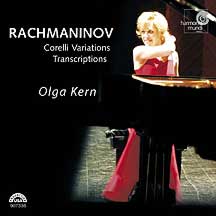
Rachmaninov Transcriptions, Corelli Variations Olga Kern was awarded the Gold Medal at the Eleventh Van Cliburn International Piano Competition in 2001 - the first woman to garner that honor in over thirty years. On her new release Olga Kern performs a dazzling program of Rachmaninov’s piano transcriptions of of music by Bach, Bizet, Kreisler, Mendelssohn, Mussorgsky, Rimsky-Korsakov, Schubert and Tchaikovsky, his Corelli Variations, and the Liszt Hungarian Rhapsody No. 2 — with Rachmaninov’s own cadenza, transcribed from his recordings. |

Belshazzar's Feast Composer: William Walton Performers: Purves, Lindley, Daniel Naxos Sir William Walton's Belshazzar's Feast, composed in 1930-31, is the finest British choral work since Elgar's Dream of Gerontius, although it is far more "modern." Scored for baritone, choir and orchestra Belshazzar is a compact work lasting just under 45 minutes. It recounts the Biblical story of the downfall of the proud Belshazzar, King of Babylon whose doom is foretold by a ghostly hand writing the chilling prophecy on the wall during a banquet. Walton's dazzling and often times startling music is gripping from the first bar to the last. |
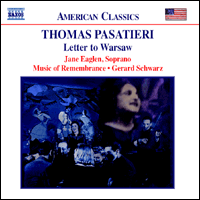
Letter to Warsaw Jane Eaglen, soprano / Mina Miller, piano / Music of Remembrance / Gerard Schwarz, conductor American composer Thomas Pasatieri created this powerful song cycle, setting six texts by poet/cabaret artist Pola Braun, who wrote these texts while in the Warsaw Ghetto and in the Majdanek concentration camp, where she perished in 1943. The poems bear poignant, painful witness to the disruption, forced disintegration and, finally, destruction of daily life of every Jew in Poland in World War II. Pasatieri is best known for his many film orchestrations including Road to Perdition, Finding Nemo, and Angels in America. Here, he takes full advantage of Jane Eaglen's glorious voice and his orchestrations reveal a composer of considerable depth. |
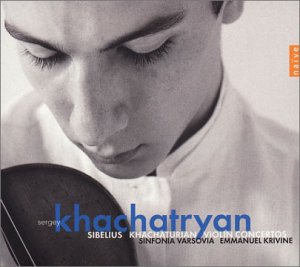
Violin Concertos Composers: Sibelius, Khachaturian Performers: Sinfonia Varsovia, Emmanuel Krivine Naive (Naxos) 18-year-old Armenian wunderkind tosses off the Sibelius with a dazzling display of sheer virtuosity and delivers a much deeper, more sober reading of his fellow countryman's bouncy masterpiece than we are accustomed to hearing. Eye-opening performance and a performer to watch.
|
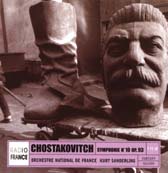
Symphony No. 10 Composer: Dmitri Shostakovich Kurt Sanderling (conductor) Orchestre National de France Naive (Naxos) Re-issue
of an inspired 1978
|

Seven: A Suite for Orchestra Composer: Tony Banks Performer: London Philharmonic Orchestra, Mike Dixon Naxos Tony
Banks, founder of the rock band Genesis, goes "classical" with this
seven-movement suite, each of them an orchestral sound picture using its
title to set the mood. The result is an extremely well-recorded bag
of ambiant musical noodles that are less frivelous than they might have
been and, in any event, less painful to the ears than listening to
Phil Collins sing.
|
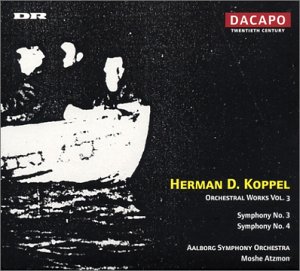
Symphony No. 3 Op. 39. Symphony No. 4 Op. 42 Composer: Herman D. Koppel Conductor: Moshe Atzmon, Aalborg Symphony Orchestra Da Capo [Naxos] During the German occupation of Denmark in World War II, Herman D. Koppel, who was Jewish, and his family had to flee to Sweden, where they met a childhood friend of Koppel who had become a baroness. In her house Koppel could compose in peace and quiet. The Third Symphony is dedicated to her. Despite his own safe surroundings, Koppel’s experience of the war, and of the execution of his Polish-Jewish family in German concentration camps, had a profound impact on his works from this period. These are works of anguish that explore the depths of the composer's emotions--a final liberation from the bloodless influence of his teacher Carl Neilsen--and the birth of major, overlooked 20th century music figure. |

Die Jakobsleiter Composer: Arnold Schoenberg, Henschel, Meier, Nagano Harmonia Mundi One of many important large-scale fragments left uncompleted by Schoenberg at his death, the oratorio Jacob's Ladder was finished by Winfried Zillig, once a student, at the behest of Schoenberg's widow after his death. Schoenberg wrote the libretto between 1915 and 1917 based on the book of Genesis, overlaid with elements from Strindberg's drama Jacob Wrestles, and Balzac's novel Seraphita. He wrote a large of chunk of the music shortly after but was called to the army and never got around to finishing it. This is a brilliant, committed performance that captures a little-known masterpiece by one of the 20th century's greatest composers at the height of his creative powers. |
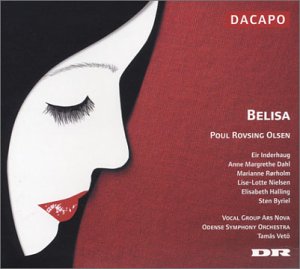
Belisa Composer: Poul Rovsing Olsen Performer(s): Inderhaug, Byriel, Rorholm, Veto Da Capo [Naxos] When composing his music for Belisa, Poul Rovsing Olsen was deeply inspired by Spanish poet Federico García Lorca's drama and by the passionate and demanding character of Belisa herself. The opening scene of the opera is the wedding night of Belisa and Don Perlimplin, where the young bride takes 5 lovers in front of her decrepit groom that is sound asleep. The drama develops from stylized opera buffa into the ambiguous and surreal with an unexpected ending, and Poul Rovsing Olsen's music reflects Lorca’s drama like a sensuous kaleidoscope with French and Oriental overtones. |
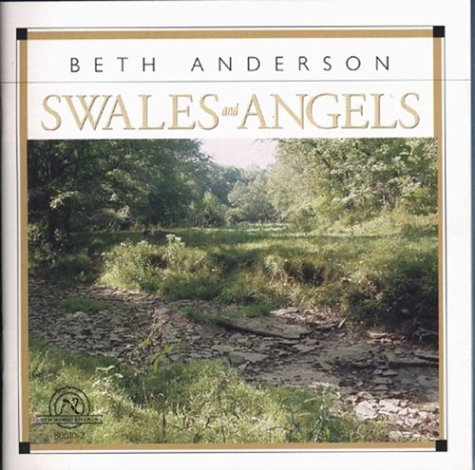
Swales and Angels Composer: Beth Anderson Conductor: Gary M. Schneider Performer: Rubio String Quartet, Jessica Marsten (soprano), et al. New World Records Beth
Anderson's unabashedly romantic "swales" are as pure as a Kentucky mountain
spring, frisky as a new-born colt rolling in bluegrass, and infectious
as a third-grade measles outbreak. They are light, without being
lightweight, and conquer the ear by their deceptively easygoing charm.
If you like Paul Schoenfeld's brand of Americana, you'll like these pieces
a lot.
|
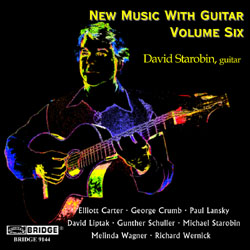
New Music With Guitar, Volume Six Composers: Various Performer: David Starobin Bridge Records No one has done more to champion guitar music by contemporary composers than the brilliant guitarist and co-founder of Bridge Records, David Starobin. This CD includes solo and chamber works written between 1992 and 2000 by Gunther Schuller, Michael Starobin, Richard Wernick, Melinda Wagner, David Liptak, and Paul Lansky--all in premiere recordings. Volume Six also contains George Crumb's "Mundus Canis"--with the composer performing (and whispering and yelling) on percussion. To conclude the disc, Elliott Carter's fantastically inventive sextet, "Luimen" is performed by Speculum Musicae, New York City's virtuoso new music band. |
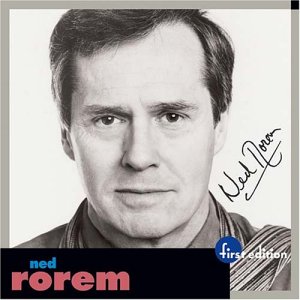
11 Studies for 11 Players: Piano Concerto Composer: Ned Rorem Performer(s): , Lowenthal, Mester, Louisville Orchestra First Edition Rorem ages well and a recent spate of re-releases of his early chamber and orchestral works demonstrate that he is a good deal more than simply a master of art songs. Like most of Rorem's work, 11 Studies is distinctly more European than American and recall Berio's marvelous Sequenzas. |
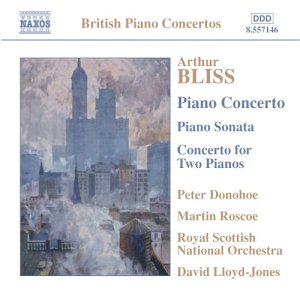
Piano Concerto. Concerto for two pianos. Piano Sonata Composer: Arthur Bliss Performers: . Peter Donohoe, Martin Roscoe (pianos), Royal Scottish National Orchestra, David Lloyd-Jones (conductor). Naxos The piano concerto is rip-snorting, full-blooded, heavy breathing romantism of the Rachmaninov variety played with over-the-top virtuosity by the nimble Peter Donohoe. Listening to it makes you want to invade Russia. |
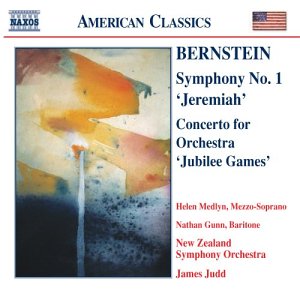
Symphony No.1, 'Jeremiah'. Jubilee Games Composer: Leonard Bernstein Performers: Helen Medlyn (mezzo), Nathan Gunn (baritone), New Zealand Symphony Orchestra, James Judd (conductor). Naxos Young Bernstein, filled with piss and vinegar and more musical ideas per page than any eight of his contemporaries. A joy to listen to a genius in the process of finding his compositional voice. |
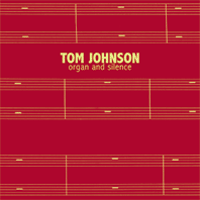
Organ and Silence Composer: Tom Johnson Performer: Wesley Roberts, organ A collection of 28 organ pieces to be played separately or as a long recital A music concerned for, as the author writes in the disc notes, "… the importance of silence in music…". This work is conceived not "for organ" but, really, for "organ and silence", as the silence is a fundamental part of it, and it’s not possible to give it up. It’s an attempt, as the author explain " to permit as much silence as possible, without allowing the music to actually stop". Tom Johnson is one of the masters of minimalism, but he combines this with rigorous logic. His work, free from false glitters, defines, better that any other one, the sense of a research the goes beyond the strict genre definitions, and become poetic application of original ideas. |
 |
Search WWWSearch www.sequenza21.com |
